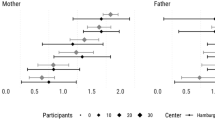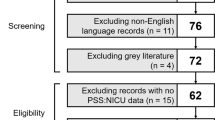Abstract
The Neonatal Intensive Care Unit (NICU) is a highly stressful environment for parents. The Parental Stressor Scale: Neonatal Intensive Care Unit (PSS: NICU) has been validated and used in several languages aside Arabic. This study aimed at translating the scale to Arabic (A-PSS: NICU) and validating it using a cohort of parents of infants admitted to the NICU. Between August 2015 and May 2017, the reliability and construct validity of the A-PSS: NICU were tested on 207 mothers and fathers in two tertiary care hospitals within Greater Beirut. Participants answered the A-PSS: NICU questionnaire, and were interviewed by a clinical psychologist who used the Hamilton Anxiety Rating Scale (HAM-A). An exploratory factor analysis revealed that the A-PSS: NICU is composed of four factors. The A-PSS: NICU overall reliability was excellent (Cronbach’s alpha .92). The A-PSS: NICU scores correlated positively and significantly with those of the HAM-A (r = .24, p < .0001). The A-PSS: NICU is a valid and reliable measure of parents’ stress in the NICU. Using this scale may prove to be beneficial to Arabic-speaking parents as it assists health professionals in identifying potential stressors that can be addressed during the infants’ stay within the NICU.

Similar content being viewed by others
References
Ahn, Y.-M., & Kim, N.-H. (2007). Parental perception of neonates, parental stress and education for NICU parents. Asian Nursing Research, 1(3), 199–210.
Alkozei, A., McMahon, E., & Lahav, A. (2014). Stress levels and depressive symptoms in NICU mothers in the early postpartum period. The Journal of Maternal-Fetal & Neonatal Medicine, 27(17), 1738–1743.
Anderson, C., & Cacola, P. (2017). Implications of preterm birth for maternal mental health and infant development. MCN: The American Journal of Maternal/Child Nursing, 42(2), 108–114.
Baia, I., Amorim, M., Silva, S., Kelly-Irving, M., de Freitas, C., & Alves, E. (2016). Parenting very preterm infants and stress in Neonatal Intensive Care Units. Early Human Development, 101, 3–9.
Beheshtipour, N., Baharlu, S. M., Montaseri, S., Mostajab, S., & Ardakani, R. (2014). The effect of the educational program on Iranian premature infants’ parental stress in a Neonatal Intensive Care Unit: A double-blind randomized controlled trial. International Journal of Community Based Nursing-Midwifery, 2(4), 240–250.
Benzies, K. M., Magill-Evans, J. E., Hayden, K. A., & Ballantyne, M. (2013). Key components of early intervention programs for preterm infants and their parents: A systematic review and meta-analysis. BMC Pregnancy and Childbirth, 13(1), S10.
Browne, J. V., & Talmi, A. (2005). Family-based intervention to enhance infant–parent relationships in the Neonatal Intensive Care Unit. Journal of Pediatric Psychology, 30(8), 667–677.
Buda, R., & Elsayed-Elkhouly, S. M. (1998). Cultural differences between Arabs and Americans: Individualism-collectivism revisited. Journal of Cross-Cultural Psychology, 29(3), 487–492.
Busse, M., Stromgren, K., Thorngate, L., & Thomas, K. A. (2013). Parents’ responses to stress in the Neonatal Intensive Care Unit. Critical Care Nurse, 33(4), 52–59.
Carter, J. D., Mulder, R. T., Frampton, C., & Darlow, B. A. (2007). Infants admitted to a Neonatal Intensive Care Unit: Parental psychological status at 9 months. Acta Paediatrica, 96(9), 1286–1289.
Erdem, Y. (2010). Anxiety levels of mothers whose infants have been cared for in unit level-I of a Neonatal Intensive Care unit in Turkey. Journal of Clinical Nursing, 19(11–12), 1738–1747.
Feeley, N., Zelkowitz, P., Cormier, C., Charbonneau, L., Lacroix, A., & Papageorgiou, A. (2011). Posttraumatic stress among mothers of very low birthweight infants at 6 months after discharge from the Neonatal Intensive Care Unit. Applied Nursing Research, 24(2), 114–117.
Feldman, R., & Eidelman, A. I. (2007). Maternal postpartum behavior and the emergence of infant–mother and infant–father synchrony in preterm and full-term infants: The role of neonatal vagal tone. Developmental Psychobiology, 49(3), 290–302.
Field, T. (2010). Postpartum depression effects on early interactions, parenting, and safety practices: A review. Infant Behavior and Development, 33(1), 1–6.
Forcada-Guex, M., Borghini, A., Pierrehumbert, B., Ansermet, F., & Muller-Nix, C. (2011). Prematurity, maternal posttraumatic stress and consequences on the mother–infant relationship. Early Human Development, 87(1), 21–26.
Franck, L. S., Cox, S., Allen, A., & Winter, I. (2005). Measuring Neonatal Intensive Care Unit-related parental stress. Journal of Advanced Nursing, 49(6), 608–615.
Greene, M., Rossman, B., Meier, P., & Patra, K. (2017). Parental perception of child vulnerability among mothers of very low birth weight infants: Psychological predictors and neurodevelopmental sequelae at 2 years. Journal of Perinatology, 37(4), 454.
Guillaume, S., Michelin, N., Amrani, E., Benier, B., Durrmeyer, X., Lescure, S., … Jarreau, P.-H. (2013). Parents’ expectations of staff in the early bonding process with their premature babies in the intensive care setting: A qualitative multicenter study with 60 parents. BMC Pediatrics, 13(1), 18.
Hamilton, M. (1959). The assessment of anxiety states by rating. Psychology and Psychotherapy: Theory, Research and Practice, 32(1), 50–55.
Hawes, K., McGowan, E., O’Donnell, M., Tucker, R., & Vohr, B. (2016). Social emotional factors increase risk of postpartum depression in mothers of preterm infants. The Journal of Pediatrics, 179, 61–67.
Holditch-Davis, D., Bartlett, T. R., Blickman, A. L., & Miles, M. S. (2003). Posttraumatic stress symptoms in mothers of premature infants. Journal of Obstetric, Gynecologic, and Neonatal Nursing, 32(2), 161–171.
Holditch-Davis, D., Santos, H., Levy, J., White-Traut, R., O’Shea, T. M., Geraldo, V., & David, R. (2015). Patterns of psychological distress in mothers of preterm infants. Infant Behavior and Development, 41, 154–163.
Hu, L., & Bentler, P. M. (1999). Cutoff criteria for fit indexes in covariance structure analysis: Conventional criteria versus new alternatives. Structural Equation Modeling, 6(1), 1–55.
Huhtala, M., Korja, R., Lehtonen, L., Haataja, L., Lapinleimu, H., Rautava, P., & Group, P. S. (2014). Associations between parental psychological well-being and socio-emotional development in 5-year-old preterm children. Early Human Development, 90(3), 119–124.
Ichijima, E., Kirk, R., & Hornblow, A. (2011). Parental support in Neonatal Intensive Care Units: A cross-cultural comparison between New Zealand and Japan. Journal of Pediatric Nursing: Nursing Care of Children and Families, 26(3), 206–215.
Ionio, C., Colombo, C., Brazzoduro, V., Mascheroni, E., Confalonieri, E., Castoldi, F., & Lista, G. (2016). Mothers and fathers in NICU: The impact of preterm birth on parental distress. Europe’s Journal of Psychology, 12(4), 604.
Kearvell, H., & Grant, J. (2010). Getting connected: How nurses can support mother/infant attachment in the Neonatal Intensive Care Unit. The Australian Journal of Advanced Nursing, 27(3), 75.
Lee, H. C., Bennett, M. V., Schulman, J., Gould, J. B., & Profit, J. (2016). Estimating length of stay by patient type in the Neonatal Intensive Care Unit. American Journal of Perinatology, 33(08), 751–757.
Lefkowitz, D. S., Baxt, C., & Evans, J. R. (2010). Prevalence and correlates of posttraumatic stress and postpartum depression in parents of infants in the Neonatal Intensive Care Unit (NICU). Journal of Clinical Psychology in Medical Settings, 17(3), 230–237.
Maier, W., Buller, R., Philipp, M., & Heuser, I. (1988). The Hamilton Anxiety Scale: Reliability, validity and sensitivity to change in anxiety and depressive disorders. Journal of Affective Disorders, 14(1), 61–68.
Marsh, H. W., Balla, J. R., & Hau, K. T. (1996). An evaluation of incremental fit indices: A clarification of mathematical and empirical properties. In G. A. Marcoulides & R. E. Schumacker (Eds.), Advanced structural equation modelling: Issues and techniques (pp. 315–535). London, NJ: Erlbaum Publishers.
Matricardi, S., Agostino, R., Fedeli, C., & Montirosso, R. (2013). Mothers are not fathers: Differences between parents in the reduction of stress levels after a parental intervention in a NICU. Acta Paediatrica, 102(1), 8–14.
Miles, M. S., Funk, S. G., & Carlson, J. (1993). Parental Stressor Scale: Neonatal Intensive Care Unit. Nursing Research, 42, 148–152.
Miles, M. S., & Holditch-Davis, D. (1997). Parenting the prematurely born child: Pathways of influence. Paper presented at the Seminars in perinatology.
Mizrak, B., Deniz, A. O., & Acikgoz, A. (2015). Anxiety levels of mothers with newborns in a Neonatal Intensive Care Unit in Turkey. Pakistan Journal of Medical Sciences, 31(5), 1176.
Montirosso, R., Provenzi, L., Calciolari, G., & Borgatti, R. (2012). Measuring maternal stress and perceived support in 25 Italian NICUs. Acta Paediatrica, 101(2), 136–142.
Paulson, J. F., Dauber, S., & Leiferman, J. A. (2006). Individual and combined effects of postpartum depression in mothers and fathers on parenting behavior. Pediatrics, 118(2), 659–668.
Preyde, M., & Ardal, F. (2003). Effectiveness of a parent “buddy” program for mothers of very preterm infants in a Neonatal Intensive Care Unit. Canadian Medical Association Journal, 168(8), 969–973.
Reid, T., & Bramwell, R. (2003). Using the Parental Stressor Scale: NICU with a British sample of mothers of moderate risk preterm infants. Journal of Reproductive and Infant Psychology, 21, 279–291.
Schappin, R., Wijnroks, L., Venema, M. M. U., & Jongmans, M. J. (2013). Rethinking stress in parents of preterm infants: A meta-analysis. PLoS ONE, 8(2), e54992.
Shaw, R. J., Bernard, R. S., DeBlois, T., Ikuta, L. M., Ginzburg, K., & Koopman, C. (2009). The relationship between acute stress disorder and posttraumatic stress disorder in the Neonatal Intensive Care Unit. Psychosomatics, 50(2), 131–137.
Sikorova, L., & Kucova, J. (2012). The needs of mothers to newborns hospitalised in Intensive Care Units. Biomedical Papers of the Medical Faculty of the University Palacký, Olomouc, Czechoslovakia, 156(4), 330–336.
Souza, S. R., Dupas, G., & Balierio, M. M. (2011). Cultural adaptation and validation for the Portuguese language of the Parental Stress Scale: Neonatal Intensive Care Unit (PSS:NICU). Acta Paulista de Enfermagem, 25(2), 171–176. https://doi.org/10.1590/S0113-21002012000200003.
Turan, T., Başbakkal, Z., & Özbek, Ş. (2008). Effect of nursing interventions on stressors of parents of premature infants in Neonatal Intensive Care Unit. Journal of Clinical Nursing, 17(21), 2856–2866.
Weis, J., Zoffmann, V., Greisen, G., & Egerod, I. (2013). The effect of person-centred communication on parental stress in a NICU: A randomized clinical trial. Acta Paediatrica, 102(12), 1130–1136.
Welch, M. G., Halperin, M. S., Austin, J., Stark, R. I., Hofer, M. A., Hane, A. A., & Myers, M. M. (2016). Depression and anxiety symptoms of mothers of preterm infants are decreased at 4 months corrected age with Family Nurture Intervention in the NICU. Archives of Women’s Mental Health, 19(1), 51–61.
Yacoub, M. I., Alkharabsheh, M. S., Zaitoun, R. S. A., & Al-Atiat, E. K. (2013). The Arabic version of the Parental Stressor Scale: Psychometric properties and Jordanian parents’ stress during child admission to PICU. Journal of Research in Nursing, 18(7), 619–633.
Acknowledgements
The authors would like to thank the parents who participated, the NICU staff of both hospitals, the clinicians, and the research assistants for their contribution to this study.
Funding
This study has been funded by the Faculty of Medicine of the American University of Beirut.
Author information
Authors and Affiliations
Corresponding author
Ethics declarations
Conflict of interest
Saadieh Masri, Lama Charafeddine, Hani Tamim, Mohamad Naamani, Taleb Jammal, and Leyla Akoury-Dirani declare that they have no conflict of interest.
Human and Animal Rights and Informed Consent
This research study is compliant with the Ethical standards of Human Rights as stated in the Declaration of Helsinky and has been approved by the Institutional Review Board of the American University of Beirut.
Additional information
Publisher's Note
Springer Nature remains neutral with regard to jurisdictional claims in published maps and institutional affiliations.
Rights and permissions
About this article
Cite this article
Masri, S., Charafeddine, L., Tamim, H. et al. Validation of the Arabic Version of the Parental Stressor Scale: Neonatal Intensive Care Unit (PSS: NICU). J Clin Psychol Med Settings 27, 593–602 (2020). https://doi.org/10.1007/s10880-019-09643-1
Published:
Issue Date:
DOI: https://doi.org/10.1007/s10880-019-09643-1




